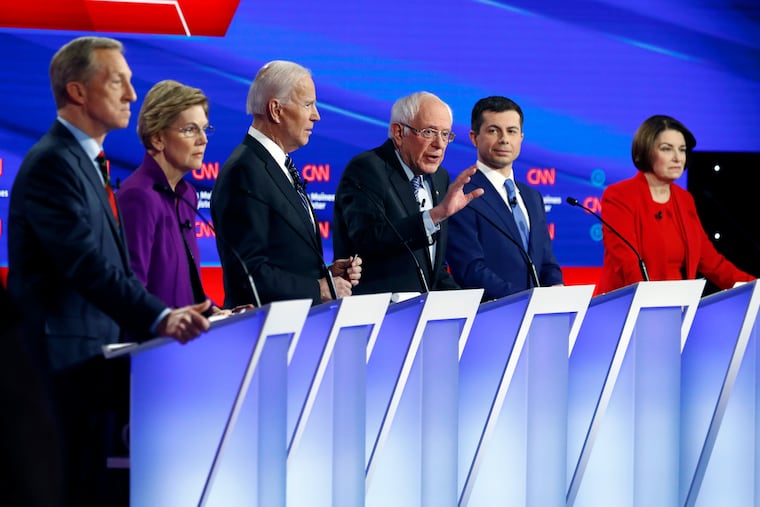As Iowa approaches, which 2020 Democrats are best on foreign policy? I Trudy Rubin
At Democratic debate, Biden and savvy Klobuchar offered best foreign policy savvy.

Although foreign policy has hardly figured in the Democratic primaries, the impeachment trial reminds us it’s time to look at which Trump opponent would make the best commander in chief.
Almost any candidate would be preferable to a president who disgraces his office by trying to blackmail a foreign leader into investigating his Democratic opponent. And Trump’s second demand of Ukraine’s President Volodymyr Zelensky – to pursue a debunked conspiracy theory that Ukraine, not Russia, hacked Democrats’ emails in 2016 – was even scarier, because it reveals a man totally susceptible to Kremlin propaganda.
So, yes, the restoration of honor and rationality to the White House is the most essential prerequisite for the next commander in chief. But the killing of Iran’s Gen. Qassem Soleimani reminds us that this job also requires good judgment and strategic thinking about impacts that will reverberate far longer than any president’s term.
» READ MORE: After Soleimani killing, how does this Iran war end?I Trudy Rubin
It was timely, then, that the latest Democratic primary debate in Iowa finally discussed foreign policy due to intensified tensions with Tehran. What emerged was sketchy, but a necessary start toward clarifying candidates’ differences from one another — and from a president who views foreign policy as a vehicle for self-promotion.
As became clear, any of the Democratic candidates would work to repair frayed relations with allies and revive the use of diplomacy, with an eye to resuscitating a degraded State Department. Any Democrat would make fighting climate change an essential part of diplomacy. Any Democrat would include protections for workers in trade agreements (as they successfully pressed for in the new trade agreement with Mexico).
And all called for U.S. combat troops to wholly or mostly quit the Middle East and Afghanistan, with much of the discussion over how quickly they’d leave.
Their performances left me with some preferences on their foreign-policy chops — but some serious doubts.
Elizabeth Warren and Bernie Sanders
I admire Sanders’ passion and prescience in voting against the Iraq war. But with his justified urge to rebuild America and stop “endless wars,” I think he underestimates the foreign-policy challenges he’d face. His stress on “bringing the world together to resolve international conflict diplomatically” sounds good. But Trump’s use of force backed by no diplomacy can’t be replaced by diplomacy backed by no force.
Similarly, Warren, was (rightly) eager to talk about the need to renew congressional authorization for the use of force before making war. But when asked whether there were any circumstances in which she’d take military action without that approval short of direct attack, she was vague. Her righteous passion to fight corporate greed seems to absorb her far more than interest in America’s future global role.
Both those “progressive” candidates are responding to a U.S. (and Iowan) mood that displays far more interest in the home front, whose renewal will be an essential component of national security.
Yet we are entering an era of frontal competition with China and a vengeful Russia, including technology and space, that will require a commander in chief to possess foreign-policy skills and focus. The focus of Sanders and Warren lies elsewhere.
Joe Biden
The good news is that Biden, a well-known quantity, would restore decency to the White House. He would stand up proudly for American pluralism and democracy as an alternative to the autocracies Trump loves.
Biden is more measured about troop withdrawals than the progressives, arguing that special forces (but not combat troops) must be left abroad to counter terrorism. However, under Sanders’ criticism, he bragged about directing the pullout of all U.S. troops from Iraq as vice president. I believe the final pullout in 2011 was a mistake, helping ISIS take over swathes of Syria and northern Iraq. Similarly, if the Iraqi government could be quietly convinced, I think it would be better to leave some troops in Iraq.
What worries me most about Biden is his level of energy and concentration, so droopy on the Iowa stage. Is he up to the challenge? Not at all clear.
» READ MORE: Trump's Impeachment defense based on lies about Ukraine I Trudy Rubin
Amy Klobuchar
Minnesota Sen. Amy Klobuchar impressed me with her “internationalism of the heartland” (an apt phrase coined by fellow columnist David Ignatius when he interviewed her several years ago).
Klobuchar is energetic and detailed about how she would try to renew nuclear talks with Iran with the aid of European allies. She speaks of rebuilding Asian alliances to double-team China on North Korea talks and on trade. She is also thoughtful on how to withdraw troops, and which forces to leave in place. And she talks clearly of how she would restore America’s moral authority and image abroad, after Trump has aligned our country “with the forces of corruption and authoritarianism.”
If Biden falters, Klobuchar deserves more attention as a potential commander in chief with energy and vision. (I’ve skipped Pete Buttigieg because I think his chances for the nomination are zero). But, to repeat, any of the Democratic candidates would bring more honor and principles to this role than President Trump.